Cashews are a beloved nut, known for their creamy texture and rich, buttery flavor.
They are often used in various recipes, such as vegan cheese, creamy sauces, and many desserts, as well as being enjoyed on their own as a tasty snack.
But what if you have a cashew allergy, or simply don’t have any cashews on hand?
What are the best substitutes for cashews? The best substitutes for cashews include other nuts and seeds like almonds, macadamia nuts, walnuts, sunflower seeds, or pistachios, as well as non-nut alternatives like chickpeas, tofu, and even avocado. The choice of substitute will depend on the recipe and the desired taste and texture.
So, if you find yourself in a situation where cashews aren’t an option, don’t fret!
This list of substitutes will ensure that your dish remains delicious and satisfying, while still delivering the creaminess and richness that cashews are known for.
Join us as we explore these 10 fantastic cashew alternatives in more detail.
What Are Cashew Nuts?

Cashew nuts are the edible seeds of the cashew tree, scientifically known as Anacardium occidentale.
Although they are commonly referred to as nuts, they are not true nuts but rather seeds enclosed in a kidney-shaped shell that grows at the end of the cashew apple.
Cashew nuts are a popular snack and ingredient in many cuisines around the world.
They are rich in healthy fats, protein, and fiber, making them a nutritious addition to a balanced diet when consumed in moderation.
Cashew nuts are also a good source of minerals such as copper, magnesium, and zinc, which are important for maintaining good health.
However, it is important to note that some people may be allergic to cashews, and cooking does not remove or change the proteins that trigger the allergy. (source: Wikipedia)
The 10 Best Substitutes for Cashews
Cashews are a delicious and versatile ingredient, but they can be hard to find in some places.
Fortunately, there are several substitutes that can offer the same flavor and texture without having to source cashews.
Here are ten of the best cashew substitutes:
1. Almonds
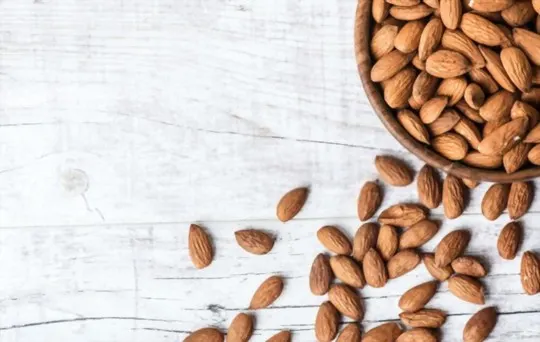
Almonds are a versatile and nutritious tree nut that can serve as an excellent alternative to cashews in various dishes and recipes.
With a slightly sweet and nutty flavor, almonds can be used in both sweet and savory dishes, making them a great option for many culinary creations.
They can be used whole, chopped, or ground into almond flour, which can be a useful ingredient in baking and cooking.
Almonds can also be soaked and blended to create almond butter or almond milk, both of which can be used as substitutes for cashew-based products.
Overall, almonds can provide a similar texture, flavor, and richness to recipes that call for cashews, making them a suitable alternative.
2. Macadamia nuts
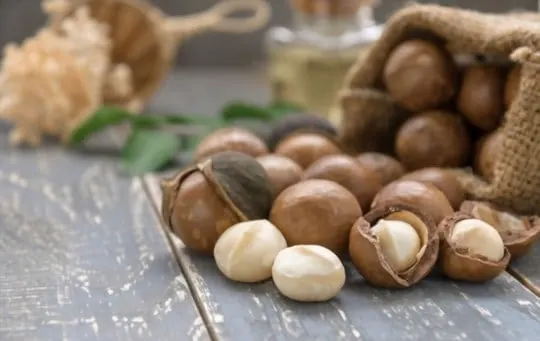
Macadamia nuts are another tree nut that can be used as a substitute for cashews in a variety of recipes.
These nuts have a rich, buttery flavor and a delicate, crunchy texture that makes them a popular choice for many dishes.
Macadamia nuts can be used in place of cashews in recipes that call for chopped or ground nuts, such as crusts, coatings, or toppings.
They can also be processed into nut butter or utilized to create a creamy sauce or dressing, similar to cashew cream.
Due to their high fat content, macadamia nuts can provide a similar richness and mouthfeel to dishes that call for cashews, making them a fitting alternative.
3. Walnuts

Walnuts are a nutrient-dense tree nut that can be used as a substitute for cashews in certain recipes.
While they have a slightly stronger flavor and a different texture compared to cashews, walnuts can still be used to add crunch and depth to a variety of dishes.
They work well when incorporated into baked goods, salads, and grain dishes, where the nutty flavor and crunchy texture can complement the other ingredients.
Walnuts can also be ground into a fine meal, which can be used in place of cashew flour in recipes that call for a nut-based flour.
Additionally, walnuts can be soaked and blended to create a creamy walnut sauce or spread, offering a unique twist on traditional cashew-based recipes.
4. Sunflower Seeds

Sunflower seeds are an excellent alternative for cashews in various dishes and recipes.
These seeds come from the sunflower plant and are rich in healthy fats, making them a fitting option for those seeking a nut-free alternative.
When toasted, sunflower seeds take on a similar texture and subtle, nutty flavor that mimics cashews.
They can be used whole or ground into a meal, making them a versatile ingredient in recipes such as energy bars, granola, and even non-dairy cheese.
For those with nut allergies or simply looking for a more affordable option, sunflower seeds are an ideal choice to replace cashews in both sweet and savory dishes.
5. Pistachios
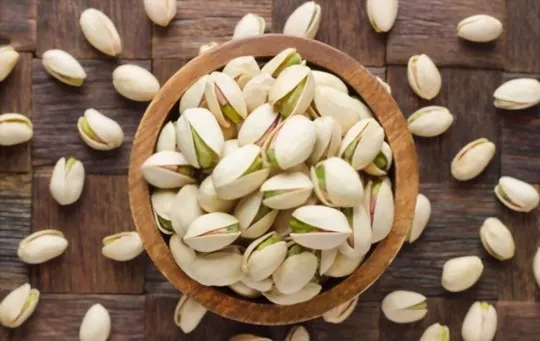
Pistachios are another fantastic substitute for cashews in various recipes.
These small, green nuts have a mild, slightly sweet flavor that works well in numerous dishes where cashews are traditionally used.
They can be enjoyed whole or chopped and incorporated into desserts, salads, and main dishes.
Pistachios also make a delicious and creamy butter that can be used as a spread or base for sauces.
When ground into a fine powder, pistachios can even be used to create a velvety, dairy-free milk.
With their delicate taste and versatile uses, pistachios are an excellent alternative for those looking to switch up their cashew-based recipes.
6. Chickpeas

Chickpeas, also known as garbanzo beans, are a legume that can effectively replace cashews in many recipes.
While chickpeas may not have the same nutty flavor as cashews, they offer a unique, savory taste that works well in a variety of dishes.
When blended, chickpeas create a smooth, creamy texture that is perfect for making hummus, salad dressings, or even vegan cheese.
Chickpea flour can also be used as a thickening agent for sauces and gravies, providing a comparable consistency to cashew-based recipes.
For those seeking a nut-free, high-protein alternative to cashews, chickpeas are a nutritious and satisfying option.
7. Tofu
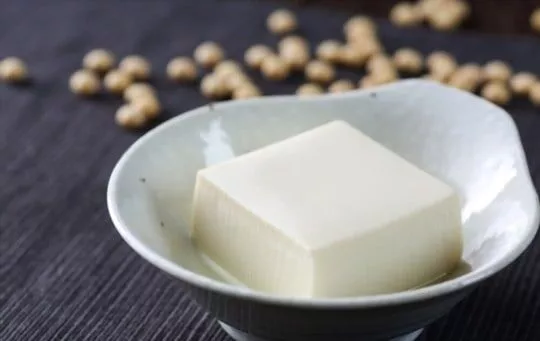
Tofu, also known as bean curd, is a versatile food item made from soybean curd.
It is a popular choice for vegans and vegetarians due to its high protein content and ability to absorb flavors from other ingredients.
Tofu can be used as a cashew substitute in a variety of dishes, such as stir-fries, salads, and even desserts.
It can be blended into creamy sauces or dressings, much like cashews, to provide a silky texture without the nutty flavor.
With its numerous forms, ranging from silken to extra-firm, tofu can be tailored to fit the desired consistency of the dish it is replacing cashews in.
8. Avocado
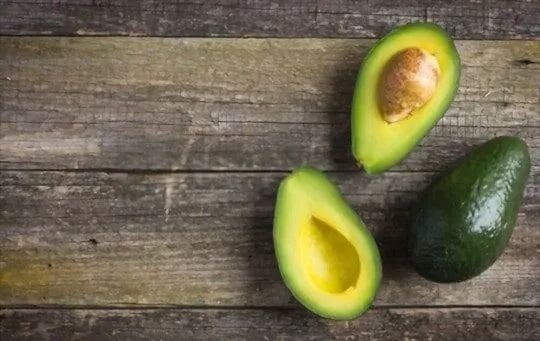
Avocado is a unique and delicious fruit that boasts a creamy consistency and subtle flavor.
Its high-fat content makes it a suitable substitute for cashews in recipes that require a thick, creamy texture.
Avocado can be used in place of cashews to make vegan spreads or dips, such as guacamole or an avocado-based pesto.
It can also be added to smoothies, providing a rich, velvety finish without the need for nuts.
Although the taste is different from cashews, avocado lends a satisfying, buttery mouthfeel to dishes while offering a heart-healthy alternative.
9. Brazil Nuts

Brazil nuts are large, flavorful tree nuts native to South America.
Their rich and slightly sweet taste makes them an excellent alternative to cashews in recipes that call for nuts.
Brazil nuts can be used in a similar manner as cashews, whether they are blended into creamy sauces, added to salads, or incorporated into desserts.
While their texture may be slightly harder than cashews, they can still provide a satisfying crunch and flavor to various dishes.
In addition to their culinary versatility, Brazil nuts are an excellent source of selenium, an essential trace mineral that supports overall health.
10. Pumpkin Seeds

Pumpkin seeds, also known as pepitas, are the edible seeds of the pumpkin or squash family.
They have a mild, slightly earthy flavor and a crunchy texture that can serve as a suitable replacement for cashews in many recipes.
Pumpkin seeds can be used in both sweet and savory dishes, such as granola, salads, or as a topping for roasted vegetables.
When ground into a fine powder or paste, they can also be used to create creamy sauces or spreads, much like cashews.
Their high nutritional value, including protein, fiber, and healthy fats, makes them a wholesome and tasty alternative to cashews in various culinary applications.
Frequently Asked Questions (FAQs)
Are almonds and cashews similar?
Almonds and cashews are similar in some ways, but they also have some differences. Both are tree nuts and are good sources of healthy fats, protein, and fiber. However, almonds are a better source of vitamin E and magnesium, while cashews are a better source of copper and phosphorus. In terms of taste and texture, almonds are generally firmer and have a slightly bitter taste, while cashews are softer and have a sweeter, buttery taste.
What is a cashew nut if not a nut?
Cashew nuts are not true nuts, but rather seeds enclosed in a kidney-shaped shell that grows at the end of the cashew apple. Botanically, they are classified as “drupes,” which are fruits with a fleshy outer layer and a hard inner shell that contains a seed. Other examples of drupes include mangoes, peaches, and olives.
Can I use peanut butter instead of cashew?
Peanut butter can be used as a substitute for cashew butter in some recipes, but the flavor and texture may be slightly different. It is important to note that peanuts are not tree nuts, but rather legumes, so they may be safe for people with cashew allergies. However, some people with peanut allergies may also be allergic to other legumes, so it is best to check with a doctor before trying a peanut butter substitute.
How do cashews compare to other nuts?
Cashews are comparable to other nuts in terms of their nutrient content, but they do have some unique qualities. They are a good source of healthy fats, protein, and fiber, as well as minerals such as copper, magnesium, and zinc. Compared to other nuts, cashews are lower in calories and higher in carbohydrates, which makes them a good choice for people who are watching their calorie intake or need more carbohydrates in their diet.
Conclusion
In conclusion, there are many great substitutes for cashews that can be used in a variety of recipes.
Whether you are allergic to cashews, looking for a more affordable option, or simply want to try something new, there are plenty of delicious and nutritious alternatives to choose from.
Some of the best substitutes include almonds, macadamia nuts, pistachios, sunflower seeds, and pumpkin seeds, all of which offer their own unique flavor and texture.
By experimenting with different substitutes, you can discover new ways to add variety and nutrition to your diet without sacrificing taste or quality.

The 10 Best Substitutes for Cashews
Ingredients
- Almonds
- Macadamia nuts
- Walnuts
- Sunflower Seeds
- Pistachios
- Chickpeas
- Tofu
- Avocado
- Brazil Nuts
- Pumpkin Seeds
Instructions
- Pick your favorite substitute from the list above.
- Follow cooking directions for your selected substitute with the proper ratio of ingredients.
Jenny has always been passionate about cooking, and she uses her platform to share her joy of food with others. Her recipes are easy to follow, and she loves giving tips and tricks to help others create their own unique culinary creations.

